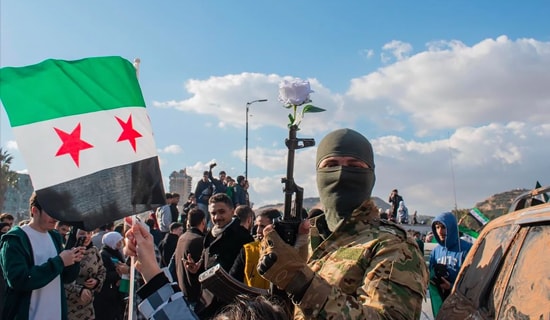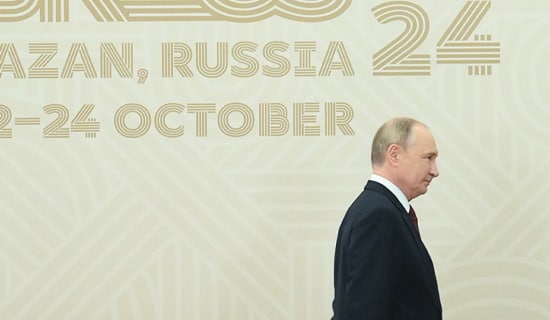The Camp David Summit confirmed the Palestinian leadership's assessment that the Oslo Process would not lead to the fulfillment of the Palestinian goals: a Palestinian state on all of the West Bank and Gaza, with Jerusalem as its capital, and the Palestinian 'Right of Return.' To achieve these goals, the Palestinian leadership believes that it is essential to create a new reality on the ground that will change the political-diplomatic situation. After the Camp David summit - about a week before the outbreak of the Intifada - the Palestinian leadership announced that Israel's refusal to accept the Palestinian demands and its attempt to ignore UN resolutions "will not lead to peace, but rather to the outbreak of violence, anarchy, and instability."[1]
During the first days of this Intifada, the Palestinians claimed that the violence erupted as a result of an "Israeli provocation." But, after the Sharm Al-Sheik Summit, the Palestinians admitted that the purpose of the violence was to create a political change, especially in the framework of negotiations. Dean of Political Science at the University of Cairo, Hasan Nafi'a, wrote that at Camp David it was revealed that Israel had no intention of allowing sole Palestinian sovereignty over Al-Haram Al-Sharif [Temple Mount]. "The Palestinian and Arab public is convinced that the peace process on the Oslo track has reached its end and there is no choice but to... seek an alternative... Hizbullah's methods seemed to be the only alternative that can restore hope and self-confidence. At this volatile stage Sharon visited Al-Haram Al-Sharif and lit the fuse of the powder keg."[2]
Now, Palestinian leaders describe the Intifada as having planned goals. Fatah Movement Secretary-General and Head of its Tanzim militia, Marwan Al-Barghuthi, said, after the Sharm Al-Sheik summit: "The Intifada broke out in order to put an end to the occupation.... The traditional interpretation that this is only a temporary outbreak is false. This time the Intifada will continue until sovereignty and independence."[3]
The Palestinian leadership hopes to create through the current Intifada a political alternative to the Oslo process. The first alternative is the internationalization of the political process. The second is a return to negotiations but on new terms and with ongoing violence as a means of pressuring Israel. The final alternative is a unilateral declaration of a Palestinian state (UDI). All of these options require a long-lasting Intifada to exploit the relative Palestinian military weakness and the disparity in casualties in order to gain international support for the Palestinian demands.
The Internationalization of the Peace Process
Throughout the Oslo Process, the Palestinians tried to shift the process from a bilateral framework of negotiations with Israel to a multilateral international one in order to undermine Israeli sovereignty and to apply greater international pressure on Israel. The Palestinians were relatively successful in this twice: the Israeli acceptance of international observers in the Hebron agreement and in the monitoring role given to the CIA in the Wye River memorandum.
Palestinian Authority (PA) Minister of Planning and International Cooperation Nabil Sha'ath frequently discussed possible international involvement in the peace process. He developed a plan, based on the "Namibia Model," to transfer the territories demanded by the Palestinians to an international body that would, in turn, transfer them to the Palestinians. Sha'ath also claimed that the President of Finland, a member of the international committee that transferred Namibia from South Africa to independent rule, was willing to fulfill a similar role in the Palestinian case.[4] Sha'ath has also lamented that the US does not bomb Israel as it bombed Yugoslavia.[5]
However, the international community has not responded to Palestinian demands for internationalization, partly because the reality in the disputed territories did not justify such intervention. Consequently, the Palestinians needed to create justification for international intervention. Since the Wye River Memorandum, the Palestinian demand for internationalization was based on the claim that the Palestinians did not have an Israeli partner to a Palestinian state and thus they needed international support to reach this solution. The international community faced a dilemma: while in principle it supported the establishment of a Palestinian state as a solution to the Palestinian problem, it also supported the Oslo process. The Netanyahu government's objection to the establishment of a Palestinian state decided this dilemma in favor of Arafat who was promised support for a unilaterally declared Palestinian state by most world leaders.
The Israeli elections changed the situation fundamentally. At Camp David, Prime Minister Barak agreed to discuss the establishment of a Palestinian state and made proposals that were acknowledged by the international community as going far beyond what any Israeli PM had agreed to in the past. Suddenly, the world community faced an Israeli partner to a settlement that included the establishment of a Palestinian state.
In these new circumstances, when Arafat rejected the various proposals brought up at Camp David, and was held responsible by President Clinton for the failure of the summit, the international community changed its position towards Palestinian demands. In the damage-control meetings Arafat held around the world after the summit, he found that international support for the UDI no longer existed. The world renewed its support for the bilateral track with Israel and encouraged Arafat to respond positively to Barak's proposals.
This development led the Palestinian leadership to change its strategy. The new plan focused on prompting international intervention regarding specific issues such as the Palestinian demand for an international committee to investigate the recent violence, a demand for international forces for the protection of the Palestinian population, and the demand for international courts to try "Israeli war criminals." This international intervention, the Palestinians hope, will gradually become an international source of authority for an alternative to the bilateral Oslo process and into international support for Palestinian demands as well.
The Palestinian demand for an international investigation committee has become the focus of their political struggle. PA Minister, Hasan 'Asfur, presented this demand as an ultimatum because "our people did not die for nothing." The New York Times columnist, Tom Friedman commented that according to 'Asfur, "these Palestinians died so there can be an international investigation into why they were killed."[6] But, the investigation itself is only a secondary goal of the Palestinian demand. Its main goal is to serve the process of internationalization. The international investigation committee was supposed to "translate the terrible and many casualties of the Palestinian people into a qualitative leap and a deep and essential change of the situation," explained Palestinian Legislative Council (PLC) member Dr. Hanan 'Ashrawi.[7] "This Intifada was supposed to be the Intifada of Independence."
The Arab summit meeting in Cairo endorsed the Palestinian demand for internationalization and applied it to the negotiations. Egyptian Foreign Minister 'Amru Moussa stated that under no circumstances should the Palestinians go back to the negotiations in the same mechanism that existed up till now.[8] At a press conference in Ramallah, PLC Chairman Ahmed Qurei (aka Abu 'Alaa) explained the new Palestinian preconditions for resumption of negotiations in detail: "The negotiations framework should be rebuilt. The European Community, Russia, China, and the UN should join the United States in the negotiations. The present structure will bring no results."[9] He added, "The rules of the game have changed. We must not go back to the negotiations based on their previous rules."[10]
Negotiate and Fight
When the Palestinian leadership returns to the negotiations, as was indicated at Sharm Al-Sheik, it will do it with - rather than instead of - the Intifada. Hani Al-Hassan, Arafat's advisor and the Fatah foreign relations chief, explained the importance of violence as a means of political pressure: "The Intifada is the best way to convince the Americans and the Israelis that they cannot force the surrender of their fundamental principles on the Palestinian people."[11]
In this gambit, the Palestinian leadership relies on the precedent of Israel's withdrawal from South Lebanon and on Israeli readiness to sign the Hebron agreement under the pressure of the violence of September 1996. From the Palestinian perspective, these events prove that Israel bends when confronted with violence.
Nabil Sha'ath elaborated on the advantages of this option: "Historically, many people have fought and negotiated simultaneously... There are many examples for that like Vietnam and Algiers... Under certain international circumstances we were forced to turn the negotiations into an alternative to fighting. However, there is a limit to that too... You can fight and negotiate at the same time."
Sha'ath continued, "This option [of armed struggle] was removed from our agenda at a certain stage when the negotiations yielded results and as long as there was hope that the negotiations lead to the Israeli withdrawal from all of our lands that were occupied in 1967. However, there was always a feeling that Israel might not withdraw. This is why President Arafat always said: "All options are open." Nobody believed him when he used to say that... However, the Palestinian people did not stop launching Intifadas against Israel and saying what it had to say in ways other than the negotiating table... The Palestinian people are a people that fight with weapons, with martyrdom, with Intifadas, with suicide bombings... We are destined to fight and negotiate simultaneously..."[12]
"This Intifada sets a new rule," stated Marwan Al-Barghuthi, "whoever wants to can go back to the negotiations, but the Palestinian people will continue their struggle, because we will not be imprisoned by the negotiating table..."[13]
The Unilateral Declaration of Independence (UDI) Option
The UDI option seems to be frozen and was not even mentioned in the Arab summit resolutions in Cairo. However, since the Palestinians refuse to stop the violence and return to the negotiations on the bilateral track, Israel refuses to resume the negotiations before violence is stopped, and attempts at internationalization have, thus far, been blocked - UDI is the only option the Palestinians can decide on independently.
The last postponement of the UDI mentioned several alternative dates, such as November 15 and January 1. This option is the Palestinian default because despite the international sympathy they have accumulated since the outbreak of the Intifada, Western leaders - even those who are supportive of the Palestinians (like French President Jacques Chirac) - have not publicly changed their objection to a UDI.
The Palestinians need international involvement for a UDI as well. This not only includes international recognition of the state, but also the involvement of the international community to prevent Israeli counter measures, such as the annexation of territories, economic detachment etc.
The renewed international support for a UDI has not yet materialized. But, the UDI option still exists because world leaders may change their positions if there is an increase in Palestinian casualties and if Israel fails to convince the international community that it is still a partner - at least in the future - to a solution based on an independent Palestinian state.
Conclusion
Both sides of the current conflict are focused on gaining the international community's support. The violent outbreak has damaged Israel's image in the world, but it has not corroded, so far, the international support Barak won at Camp David.
Israel was condemned in the UN Security Council for the "excessive use of force." But among the Israeli public the Israeli response to Palestinian violence is perceived as proportional, if not too restrained. An aggressive response initiated by Israel accompanied by an unjustified Israeli refusal to return to the negotiating table will play into the hands of the Palestinians and serve the internationalization process. Such an Israeli policy may also embarrass the US, which continues to serve as the main player in containing the Palestinian internationalization efforts.
For the Palestinians, the UDI option remains the most probable, but it can only be pursued after winning not only world sympathy for its casualties but also world support for its positions that, up to this point, has not been forthcoming. A UDI may unleash a complex series of events that could then heighten calls for international intervention.
*Yotam Feldner is MEMRI's Director of Media Analysis. Yigal Carmon is MEMRI's President
[1] Al-Hayat (London-Beirut) Sept. 24, 1999.
[2] Al-Hayat, Oct. 23, 2000.
[3] Al-Jazira TV (Qatar). Oct. 17, 2000.
[4] Al-Ayyam (PA), May 9, 1999.
[5] Palestine TV (PA), April 28, 1999.
[6] The New York Times, Oct. 13, 2000.
[7] Al-Jazira TV, Oct. 17, 2000.
[8] Al Safir (Lebanon), Oct. 24, 2000.
[9] Al-Hayat, October 26, 2000.
[10] Al-Hayat Al-Jadida (PA), Oct. 26, 2000.
[11] Al-Hayat, Oct. 22, 2000.
[12] ANN TV (London), Oct. 7, 2000.
[13] Al-Jazira TV, Oct. 17, 2000.





